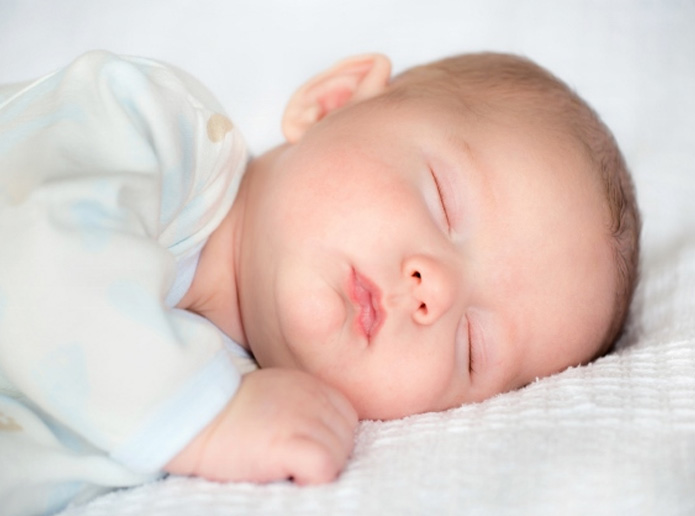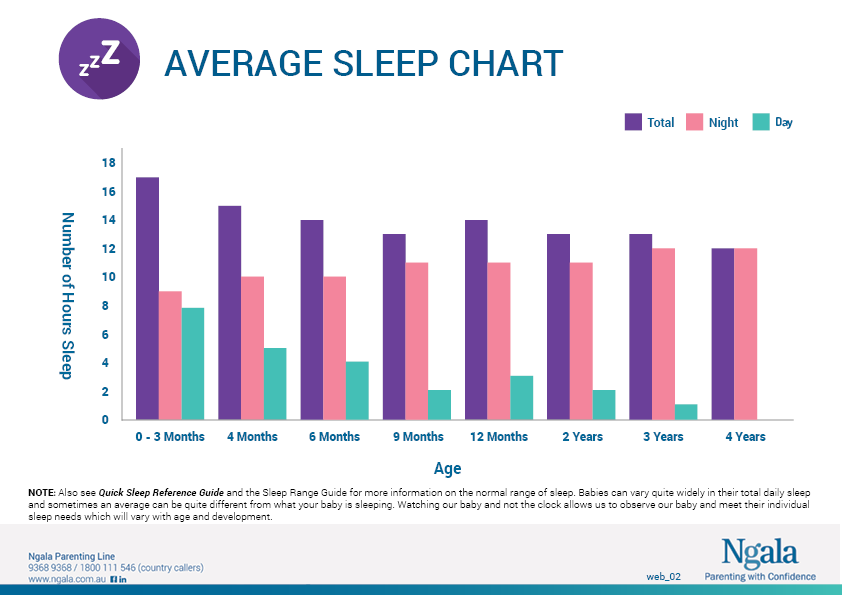Sleep is important for healthy brain development, a healthy immune system and it improves our problem solving skills. Babies who sleep and eat well are often happier, more content and less irritable.
Babies are born with no circadian rhythms, which means they don’t know the difference between night and day. Babies learn to sleep more at night by being exposed to light and dark cycles, together with cues from the environment around them.
Establish a day and night rhythm
- Offer regular milk feeds through the day
- Use a dim light but not a dark environment for day sleeps
- Expose your baby to indirect sunlight – particularly in the late afternoon to enhance the secretion of melatonin
- Create a bed time routine
- Provide a quiet, calming time before bedtime
From about six months onwards the secretion of melatonin (sleep hormone) is much greater at night than during the day.
Sleep cycles
Periods of sleep consist of a series of sleep cycles. We all have sleep cycles. When we fall asleep we move through the series of cycles. The process of becoming drowsy, falling aseep, moving into a deep sleep (non REM) then back into light sleep (REM) again is called a ‘sleep cycle’.
Being able to move from one sleep cycle to the next is a learnt skill that takes time to master. Helping our babies to go off to sleep by themselves and then helping them to resettle can be challenging, stressful and tiring, but it will get better – some babies take a little longer to learn than others.
How do I know if my baby is tired?
A tired baby may:
- close their fists
- rub their eyes
- use jerky arm and leg movements
- yawn
- have a worried facial expression
- arch backwards
- have difficulty focusing or go cross-eyed
- suck fingers as a way of self-soothing to sleep
A tired, older baby, may:
- have any of the above signs of tiredness
- pull at ears
- have clumsy behaviour
- have clingy behaviour
- need or demand more attention
- be fussy while feeding and eating
Overtired babies are more difficult to get to sleep. As a general guide:
- Newborns to 3 month old babies are likely to be overtired after 1 to 1.5 hours of awake time
- A 3 – 6 month old baby will be overtired after 1.5 to 2.5 hours of awake time
- A 6 – 12 month old baby will be overtired after 2 to 3 hours of awake time.
The average sleep by age guide is a guide to the amount of sleep a baby may have in a 24 hour period.
You can keep a track of your child’s sleep and feeding cycles, and monitor any changes, by using a sleep/feed diary.
A guide to common sleep cycles and patterns may help you to understand what the normal range looks like.
“Controlled crying”
You may have heard “controlled crying/comforting” used as a method to change babies and toddlers’ sleep behaviour. This can mean different things to different people.
Controlled crying is often associated with babies and children left to cry for a period of time. Babies and toddlers are distressed when they are not responded to when they are crying. They are very sensitive to the nurturing they receive from caregivers.
Listen – wait – plan – respond
Ngala promotes gentle, responsive settling the: Listen – Wait – Plan – Respond cycle.
- Listen to the cry: What are they trying to tell you?
- Wait and watch: Wait outside the room or in the room for enough time to assess the cry and plan your response. Does the body language and cry match their behaviour?
- Plan: Make sure you display calm, firm, kind body language, so your baby knows you are confident and that it’s sleep time.
- Respond: appropriately based on the cry, reassure them it’s ok, you’re here and it’s sleep time. Avoid prolonged eye contact as this can be as engaging as touch or talking. Wiping your baby’s face with a damp flannel can sometimes help to calm and re-focus their emotions if they are upset.
Sleep patterns change as your baby gets older and develops. Many parents are upset to find that their child – who previously slept for long periods – suddenly starts waking or becomes clingy and prone to periods of crying. This phase of clinginess is known as ‘separation anxiety’ or separation awareness and can occur in babies aged 6 to 12 months of age.
At this stage of your baby’s brain development, they do not understand that you will come back so may become upset when you leave. This can add a challenge to the sleep routine but it is important to remember that it is a normal stage of development and will pass
Want to know more?
Pregnancy, birth and baby – Sleep and settling your baby
Raising Children Network – Babies sleep
Frequently asked questions
How can I tell if my child is just bored or tired?
Sometimes you may think your child is just bored and when you give them something to do the crying and signs of tiredness stop. Watch and see if the grizzly crying and tired signs start again in a few minutes.
Babies and small children are easily distracted from their feeling of tiredness and this is why they get overtired so quickly. Overtired babies and children are more difficult to get to sleep.
My six month old baby’s day sleeps are only 30 minutes. He is bright and chirpy when I go into him. Should I persist and get him to sleep for longer?
Yes. You will probably find that he doesn’t last long once you have got him up. Try to resettle him and see if you can get him to transition from one sleep cycle to the next. Anything under 40 minutes is too short. Babies that sleep well, feed well and are more content. Sleep through the day improves sleep at night.





